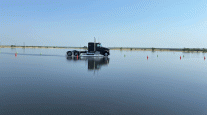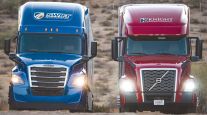OEMs Celebrate ‘Survival,’ Say Business Is Improving
This story appears in the Sept. 27 print edition of Transport Topics.
HANOVER, Germany — The magic word at last week’s opening of the world’s biggest truck show seemed to be “survival,” as various manufacturers congratulated themselves and their remaining competitors for having survived the worst economic times since the end of World War II.
A procession of speakers among the 1,731 exhibitors from 41 countries at the 63rd International Commercial Vehicles Motor Show here hit many of the same notes, saying they were glad to have survived the two years since the last show, and happy to report that business was improving — if unevenly — around the globe.
“It’s still no time to open your best bottle of Bordeaux,” said Andreas Renschler, who runs Daimler Trucks, the world’s largest commercial vehicle maker. “But I think every company that came to Hanover in 2010 can be proud to be still alive.
After a market slump of 50% and more in 2009,” he said, “that’s quite an achievement.”
Most executives interviewed said the recovery in North America is lagging behind China, India, Brazil and various other nations, with most anticipating better business levels for 2011.
As Martin Daum, who runs Daimler Trucks North America, said in an interview, “This year would seem like a disaster, if it weren’t for last year.”
Daum said he was expecting North American heavy-duty sales to total around 200,000, up from last year’s 187,000 but below even the 250,000 level which he said is what is necessary to meet basic fleet replacement needs in a normal year.
One toll of the global downturn appears to be a dearth of new product announcements at this show, which is usually host to a wealth of announcements as companies trumpet their new offerings, hoping to take advantage of the confluence of journalists from virtually every publication that covers the trucking industry.
But this year’s press conferences have mostly focused on improvements to existing products and on “glad to be here” after the recession and “happy to report a return to nearly normal market conditions” reports.
There also were a number of announcements by U.S.-based companies about bringing their products to the European market, as the trucking supply industry continues to become more global.
One of the notable trends evident at this show, which began under unusually sunny and pleasant weather in this city, is that alternative-drive vehicles have become a major force in virtually every OEM’s stable, even if makers aren’t producing profits with them as yet.
Currently most attention has been paid to light- and medium-duty applications, but even the Class 8 makers are offering hybrid options and are at work on systems to minimize, if not eliminate, diesel engines in the future.
Daum agreed that this is “a pretty boring time” for truck makers. But, he added, “I like, pretty much, what I have these days,” since DTNA is using the time to “prepare for the upswing” in business.
Daum said his best guess nowadays is that business in North America will improve markedly in the second and third quarters of 2011, some three quarters later than most analysts had expected.
During an interview, Renschler said he expected 10% sales growth in the United States this year, “slower than expected.”
He also said service was becoming an ever more important business for Daimler. The company unveiled an optional service for its customers in Europe, whereby the company guarantees it will fix a customer’s vehicle within two hours, or provide a replacement for use while the truck is being repaired.
Asked if the service, called TotalMobility, would be offered in North America, he said, “We are on our way, but not tomorrow.” Daum said the vastness of the United States presented some challenges in making such a promise to customers.
In remarks at a press reception on Sept. 20, Daimler’s Renschler said he expected the commercial vehicle market to come back strongly eventually, expanding by more than 50% by 2015, when sales would reach about 3 million vehicles.
He said the truck business is getting increasingly globalized, so that currently its trucks sold anywhere in the world have “up to 70%” common components.
Renschler said this was a good thing for all. “Commonality is also in the vital interest of our customers, because every” dollar of savings caused by this trend “can be invested in research and development” of new or improved products.
The truck show, in Hanover’s massive fairgrounds, showed some of the effect of the recession, as there were some 350 fewer exhibitors this year, compared with 2008, and seven fewer countries were represented.
The 2008 show attracted some 300,000 visitors.
This year’s show opened with two days reserved for the press, Sept. 21-22, and will remain open to the public until Sept. 30.




